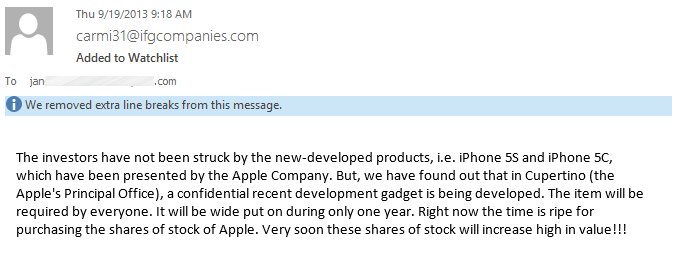Spammers Push Slice of Apple via E-mail

Spammers use the flashy and controversial iPhone 5S and iPhone 5C buzz to launch an aggressive stock scam campaign to convince people to buy “shares of stock of Apple.”
According to Bitdefender data, in a timeframe of 14 hours, 1.5 percent of one million spam e-mails sent worldwide rushed people to invest in the Cupertino-based company and invest in Apple shares as soon as possible in anticipation of another technological breakthrough.
The data appears to have originated from an internal source who syphoned some corporate projects related to a revolutionary gadget the company has currently in the works that will overthrow the recently launched iPhone 5s and 5C. “We have found out that in Cupertino (the Apple’s Principal Office), a confidential recent development gadget is being developed. The item will be required by everyone. It will be wide put on during only one year. Right now the time is ripe for purchasing the shares of stock of Apple. Very soon these shares of stock will increase high in value!” the spam message reads.
As any other stock spam message, the e-mail is made to look like a confidential private message sent by someone to only a few lucky ones.
Known as penny stock spam, this type of e-mails usually misleads people into buying shares of worthless or small companies at small prices. This will artificially increase the value of those shares in a matter of hours or days. With a sudden increase in demand, the value of those shares grows as well and scammers can sell all their shares at higher prices. And then move to another company.
This particular campaign is mostly peculiar with the scammers’ choice of the company. Apple is a big business that can easily be monitored in the media, and it is almost impossible to have confidential information circulate without media knowing about it.
The bogus e-mails are sent from servers located in the US, Canada, Brazil, Columbia, Russia, China, Belarus, Denmark and Saudi Arabia.
So, when you decide to take your chances on the stock market, it is better you consult a financial specialist and NEVER take into account money advice that comes into your inbox especially if you haven’t specifically asked for it.
This article is based on the spam samples and the technical information provided courtesy of Adrian MIRON and Eduard TATARU, Bitdefender Spam Researchers.
All product and company names mentioned herein are for identification purposes only and are the property of, and may be trademarks of, their respective owners.
tags
Author
A blend of product manager and journalist with a pinch of e-threat analysis, Loredana writes mostly about malware and spam. She believes that most errors happen between the keyboard and the chair.
View all postsRight now Top posts
How to Protect Your WhatsApp from Hackers and Scammers – 8 Key Settings and Best Practices
April 03, 2025
Outpacing Cyberthreats: Bitdefender Together with Scuderia Ferrari HP in 2025
March 12, 2025
Streamjacking Scams On YouTube Leverage CS2 Pro Player Championships to Defraud Gamers
February 20, 2025
How to Identify and Protect Yourself from Gaming Laptop Scams
February 11, 2025
FOLLOW US ON SOCIAL MEDIA
You might also like
Bookmarks








